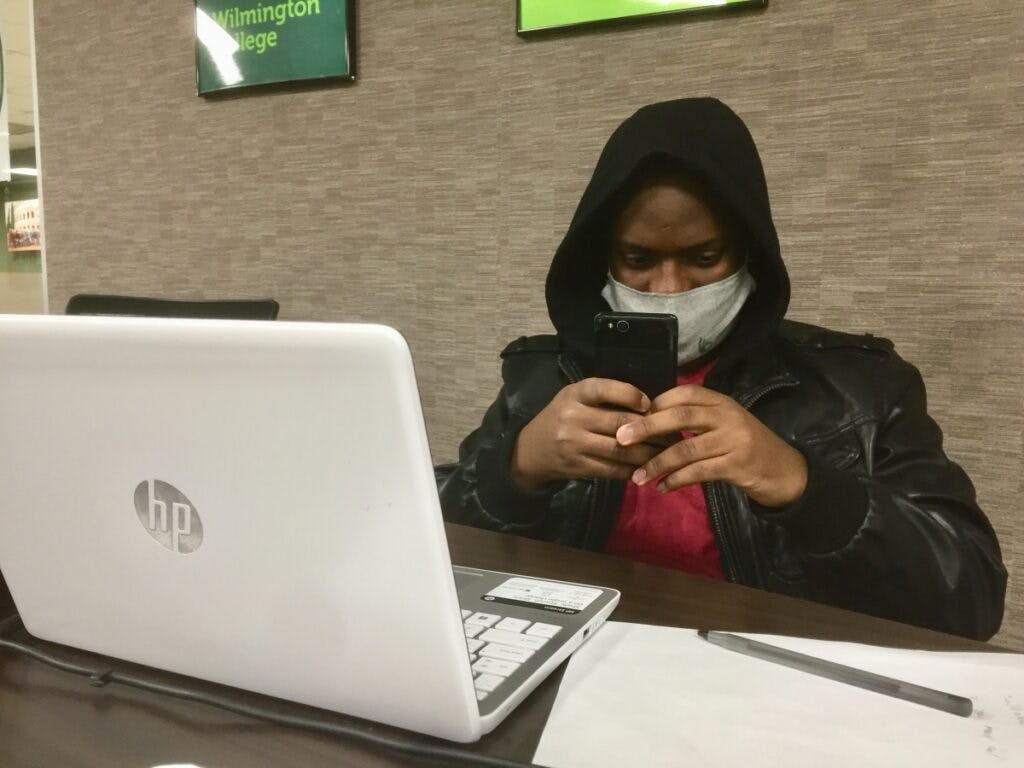Enlightening Exercise Gave Students Insight into Less Technology-Laden Eras
In a year that has been dominated by messages such as "social distancing," "closing one's circle" and "staying within our bubble," people have turned to their Smartphones and other devices to an even greater extent for entertainment, information and interpersonal connectivity.
PICTURED: Senior Jules Mushumba is pictured checking his cellphone while working on his laptop computer. Students in Dr. Audrey Wagstaff's class survived 24 hours without either of those devices.
However, Dr. Audrey Wagstaff urged her students to put their devices down — albeit for 24 hours. The associate professor of social sciences and communication arts required a media exclusion project — also known as a media cleanse — in order for her students to pass Mass Media in a Global Society.
Students refrained from using — at the very least — their mobile phones but were encouraged to cease all media use for a day. They then reflected on the experience by making connections to course concepts and sharing their reactions with one another during the final exam period.
WC's fall semester final examinations concluded Tuesday (Dec. 15).
"The project is all about mindful use of technology — a break from the screens that seem to dominate our lives," Wagstaff said, noting that, in 2020, we have become increasingly dependent on our devices as a means for human interaction, so this project felt even more necessary. "However, because of this increased dependence, I think it produced more anxiety among the students than it typically does."
Wagstaff added that, upon announcing the assignment, she noticed many students outwardly expressed this anxiety and frustration about the project while others came to find out that it was a challenge.
"Upon hearing the assignment, I scoffed at the requirement," one student wrote in his reflection. "I thought it was something I hadn’t considered difficult. However, leaving the physical classroom behind for a virtual one made me more plugged in than I ever was. This, I would soon learn, is a nasty habit to kick. In tandem with my new virtual classroom, I was also a part of a generation that has a constant fixation with trends and breaking news, furthermore, with COVID-19, every drop of news and information felt critical to the viewer as life and death."
Many students indicated that the media cleanse allowed them to take a break from what typically preoccupies them and/or hinders their productivity, Wagstaff added.
"I think it was good for me to get off social media for a day," one student wrote. "It made me not have to worry about politics, how many 'likes' I get, how many people view my posts or what people think about what I am posting."
Another student said, "My 24 hours without my phone showed me how nice it is to have quality time with more face-to-face interaction, how much I use my phone as a crutch in boring or uncomfortable situations and how nice it is to be present in the moment."
"The realization that media constantly satisfies my short attention span — which it created — reminded me of Sherry Turkle's work," another student wrote. Wagstaff cited Turkle's Reclaiming Conversation as required reading. "When I first read Turkle’s concerns about how the digital age is affecting teens, I was in denial. But after excluding media, I realized she was 100 percent correct. I mainly thought of how Turkle claimed that attention is in short supply in this digital age. I realized that I had cleaned my room in record time that day because I had no distractions."
Students also reflected on the need to find a balance between media use and nonuse, noticing that they had "more time" for chores, homework, self-reflection and family interaction. They also paid more attention to how family members use technology.
"I felt more inclined to pay attention to what my parents were seeing on their phones and computers while I was refraining from using mine," one student said. "I noticed, because of filter bubbles, that they are often coming across articles that share false information and possibly even slander the other side of the political spectrum."
Another student, unable to watch college football with his dad because of the project, struggled with feelings of "lost" social capital.
"FOMO (fear of missing out) is something that has plagued multiple generations," he wrote. "Somehow missing the tiniest detail of something made you a social outcast: 'You didn’t see Justin Fields sneak the ball in from the one-yard line?' or 'Colin Jost killed it on SNL; how’d you miss that?' These were all questions that could arise from simply missing a day of football and I was the weird person missing them all."
"I was the social outcast and quite frankly I was disgusted with myself."
Wagstaff reflected that the experience was different for many students than it would have been in previous years because students may have needed some sort of device to connect to classes or work. Indeed, most Wilmington College classes went exclusively online in mid-November.
She believes that, now more than ever, it is necessary to take a break.
"Many students have said to me that they had to use the devices they primarily used for entertainment and social interaction to meet remotely for class or complete assignments," she added. "They are literally holding the same device for work and play, so it's difficult to ascertain when work ends and play begins. My hope is that they will continue to be more mindful about that."

COVID Pandemic Can’t Stop WC Prof’s Media Exclusion Project
Communication Arts